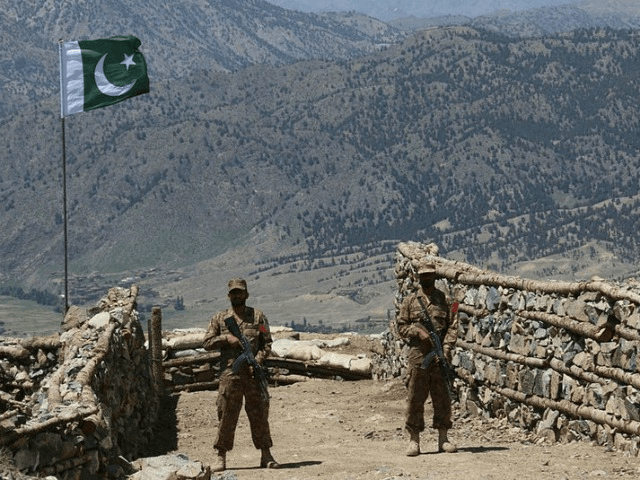Former al-Qaeda fighters have launched a new group in terrorist safe haven Pakistan for jihadists who have severed ties with the Islamic State (ISIS/ISIL) branch in the region.
Although the new group claims it has no official links to al-Qaeda or any other foreign terrorist group, it concedes that Osama bin Laden, the former al-Qaeda leader who was killed by the U.S. military, inspired its ideology, reports Voice of America (VOA).
ISIS and al-Qaeda are considered to be enemies.
Two former al-Qaeda members who had grown disgruntled with the terrorist group this year reportedly assembled the new jihadist group, dubbed Ansar al-Sharia Pakistan.
“The group was allegedly created to operate as a platform for militants who have parted ways with IS [Islamic State] in the country, it said in an online statement. It claimed to be active in several parts of the country,” notes VOA.
In an announcement disseminated through a Twitter account, Ansar al-Sharia Pakistan declared, “We give glad tidings to Muslim Ummah [community] that a large number of Mujahideen [jihadists] from Karachi, Punjab, and tribal areas are leaving ranks of IS and announce disassociation with [it].”
ISIS has “spread differences” and “secession instead of unity,” said the new terrorist group, which has vowed to continue its struggle through “jihad” against “infidel and apostates.”
VOA concedes that it was unable to independently verify the authenticity of the Twitter account linked to the newly formed jihadist organization.
However, the counterterrorism department of the Karachi police has acknowledged the new group’s existence, revealing that it maintains a presence in the Pakistani territory between Sindh and Baluchistan provinces.
Pakistani authorities believe the newly-emerged group primarily operates out of Pakistan’s largest city Karachi, which is also considered to house a significant presence of terrorists affiliated with the South Asia-based al-Qaeda in the Indian Subcontinent (AQIS) branch.
Maj. Gen. Mohammad Saeed, the head of the Rangers paramilitary security force in Karachi, told local reporters that among the members of the new group are individuals with masters degrees in applied physics.
As it expanded its foothold in Pakistan, the local Islamic State branch known as the Khorasan Province (ISIS-K) reportedly recruited from a pool of individuals with sophisticated skills at universities across the country, including students, doctors, lawyers, journalists, and businessmen, and also used women for its fundraising operations.
Maj. Saeed revealed that Ansar al-Sharia Pakistan also has female members.
Terrorist groups in the region, namely the Pakistani Taliban or Tehrik-e-Taliban Pakistan (TTP), have been engaged in efforts to recruit female jihadists, taking a page from ISIS’s playbook.
The U.S. military has linked TTP with the Islamic State, noting that the majority of ISIS-K members are former Pakistani Taliban jihadists.
Afghan and Pakistani Taliban members considered themselves to belong to two distinct groups with separate goals and led by different people.
The formation of the new jihadist group is a testament to the ongoing presence of al-Qaeda in the Afghanistan-Pakistan region, nearly 16 years after the U.S. military was deployed to defeat the terrorist organization in response to the September 11, 2001, attacks on the American homeland.
Despite the trillions of American taxpayer dollars invested in defeating the Afghan Taliban and its ally al-Qaeda in Iraq and Afghanistan, and the thousands of U.S. military service members killed and injured trying to carry out that mission, the two groups are believed to have grown stronger in recent years.
In its latest assessment of the U.S. war in Afghanistan, which began in October 2001, the Pentagon notes:
The Afghanistan-Pakistan border region remains a sanctuary for various groups, including al Qaeda, al Qaeda in the Indian Subcontinent (AQIS), the Haqqani Network, Lashkar-e- Tayyiba, Tehrik-e-Taliban Pakistan (TTP), ISIS-K, and the Islamic Movement of Uzbekistan. Sanctuary on the Pakistan side and presence on the Afghan side remain a security challenge for both countries and pose a threat to regional security and stability.
Echoing Indian and Afghan officials, the Pentagon has long accused Pakistan of harboring terrorist groups, particularly the Afghan Taliban, al-Qaeda, and their ally the Haqqani Network, considered one of the top threats facing U.S. troops in Afghanistan.
Islamabad denies the allegations.
Ansar al-Sharia Pakistan, the newly formed terrorist group, has already been linked to several terrorist attacks in Pakistan’s southern port city of Karachi, notes VOA, citing counterterrorism authorities in Islamabad.
The name “Ansar al-Sharia” has been used by jihadists groups in various countries affiliated with al-Qaeda.
In particular, the allegedly dissolved al-Qaeda affiliate in Libya that the U.S. believes was behind the Benghazi attack that killed four Americans called itself Ansar al-Sharia in Libya (ASL).
Nevertheless, the newly-formed Ansar al-Sharia Pakistan insists it is not officially linked to any foreign terrorist organization, particularly al-Qaeda.

COMMENTS
Please let us know if you're having issues with commenting.